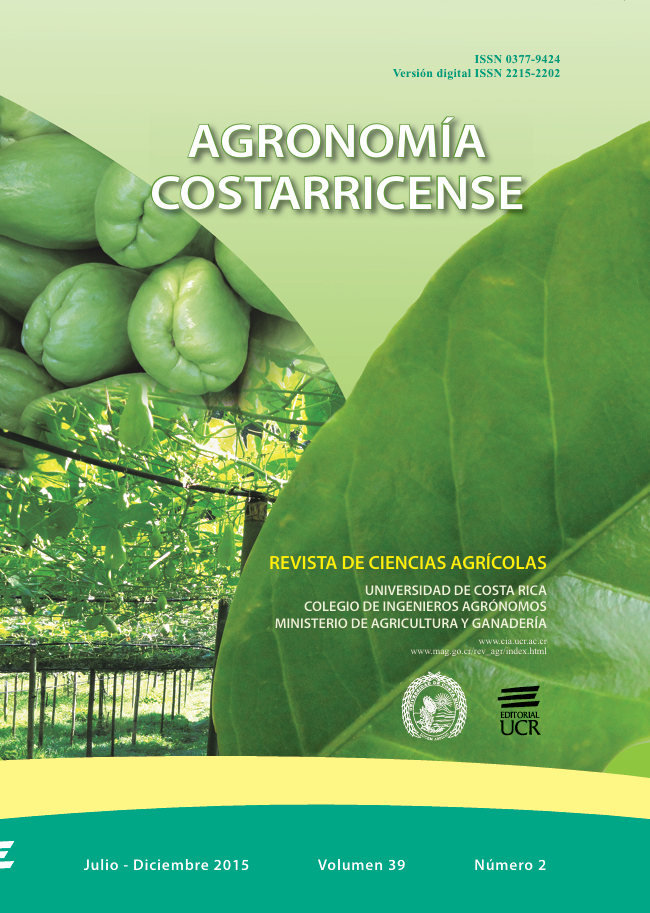Abstract
Temperature is one of the major climatic factors that affect growth, development and yield of the rice crop, and also can reduce the time of change of phenological stages. The beginning stages of tillering, initiation of primordia, flowering and harvest maturity were determined with the S, V and R system recently proposed by Counce et ál. (2000); it consists on counting the number of fully developed leaves; in addition, a correlation was made with accumulated degree days that the plant had at that time, in order to estimate with how many degree days the plant began a phenological stage; this parameter is related to the average daily temperature and a base temperature of 10ºC. For the start of tillering the plant needed 140.9 degree days; for primordium start, 1268.9; for bloom 1746; and completed its cycle with a total of 2333.2 degree days. This allows to conclude that, for a variety of long cycle (130-135 days), when the accumulation of degree days is equal or similar to the previous data, the plant initiates one of the above-mentioned phenological stages; however, each one of the varieties in use by farmers must be calibrated, because there are differences in crop cycle length among them.References
ARNOLD C. 1960. Maximun-minimum temperatures as a basis for computing heat units. Journal of the American Society for Horticultural Sciences, Alexandria 76:682-692.
COUNCE P., KEISLING T., MITCHELL A. 2000. A Uniform, Objective and Adaptive System for Expressing Rice Development. Crop Sciencie 40:436-443.
DATTA S. 1986. Crecimiento y desarrollo de la planta de arroz. Producción de arroz. Fundamentos y Prácticas. Primera Edición. Editorial Limusa. 685 p.
HAUN J. 1973. Visual quantification of wheat development. Agron. J. 55:487-491. IIRI. 1980. Standard evaluation system for rice. IRRI, Los Baños, Phillipines. 52 p.
LANCASHIRE P., BLEIHOLDER H., VAN DEN BOOM P., LANGELUDDEKE P., STAUSS E., WEBER E., WITZENBERGER. 1991. A uniform decimal code for growth stages of crops and weeds. Ann. Appl. Biol. 119:561-601.
LANGER R. 1972. How grasses grow. Edwuard Arnold, Ltda. London. 66 p. MÉNDEZ R. 2002. Eventos fenológicos. Previsión de ocurrencia en el cultivo de arroz a través del modelo de suma térmica. Revista Arroz ACA 3(33):22-25.
MALDONADO I.B., CARAM G.A., ANGELONI P.N., FERNANDEZ C. 2006. Determinación del tiempo termal en la aparición de hojas de híbridos de girasol en Chaco. Cátedra de Agroclimatología, Facultad de Ciencias Agrarias, UNNE. Argentina. 5 p.
NISHIYAMA I. 1976. Effects of temperatura on the vegetative growth of rice plants. Climate and Rice, pp. 159-185. Proceedings of the symposium on climate and rice. International Rice Research Institute, Los Baños, Phillippines.
PASCALE A.J., DAMARIO E.A. 2004. Bioclimatología agrícola y Agroclimatología, pp. 184-210. In: Estimaciones Agroclimáticas de unidades calóricas Ed. Facultad de Agronomía. UBA.
SAUMELL H. 1980. Girasol: Técnicas actualizadas para su mejoramiento y cultivo, pp. 81-83. In: Editorial Hemisferio Sur S.A. Argentina.
STEINMETZ S. 2007. Impacto das mudancas climáticas globais sobre o arroz irrigado no Sul do Brasil, pp. 828-831. V Congresso Brasileiro de Arroz Irrigado. ANAIS XXVII Reuniao da Cultura do Arroz Irrigado. EMBRAPA Clima Temperado.
STEINMETZ S., FAGUNDEZ P., SCIVITTARO W., ULGUIM A., NOBRE F., PITANEL J., OLIVEIRA J., DA COSTA A. 2007. Estadios de desenvolvimiento de 12 cultivares de arroz irrigado expressos em graus-dia, pp. 368-369. V Congreso Brasileiro de arroz irrigado. Pelotas, Brasil. Anais, volumen I.
STRECK N., WEISS A., XUE Q., BAENZIGER P., 2003. Improving predictions of developmental stages in winter wheat: A modified wang and Engel model. Agricultural and Forest Meteorology, Amsterdam 115(3-4):139-150.
VILLALOBOS R., RETANA J. 1997. Posibles efectos de un calentamiento global en el cultivo de arroz de secano en el pacífico norte de Costa Rica. Agronomía Costarricense 21(2):179-188.
YOSHIDA S. 1981. Fundaments of rice crop science. International Rice Research Institute, Los Baños, Phillipines p. 296. ZADOKS J., CHANG T., KONZAK C. 1974. A decimal code for growth stages of cereals. Weed Res. 14:415-421.

